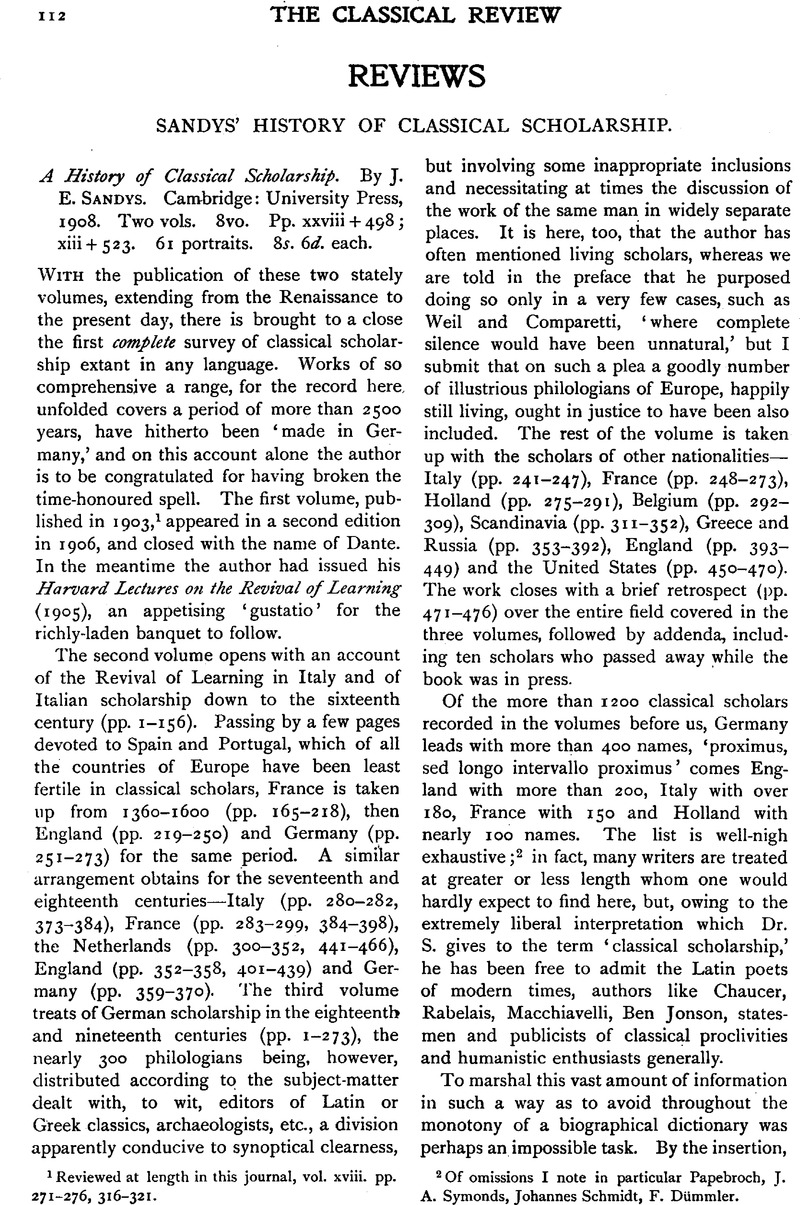No CrossRef data available.
Article contents
Sandys' History of Classical Scholarship - A History of Classical Scholarship. By J. E. Sandys. Cam-bridge: University Press, 1908. Two vols. 8vo. Pp. xxviii + 498; xiii + 523. 61 portraits. 8s. 6d. each.
Published online by Cambridge University Press: 27 October 2009
Abstract

- Type
- Reviews
- Information
- Copyright
- Copyright © The Classical Association 1909
References
page 112 note 1 Reviewed at length in this journal, vol. xviii. pp. 271–276, 316–321.
page 112 note 2 Of omissions I note in particular Papebroch, J. A. Symonds, Johannes Schmidt, F. Dümmler.
page 113 note 1 Full bibliographical details are accumulated in the footnotes, but unfortunately these are too frequently so vague as to be of little use to one who hasn't access to a British Museum catalogue. Thus, to mention but one typical instance out of many: Vol. iii. p. 1957, we are told that a bibliography of Traube's writings was compiled by P. Lehmann. I fancy, there will be but few readers who will guess that the author refers to Rendiconti della Reale accademia dei Lincei, xvi. (1907), pp. 351–361 for the revised reprint in Traube's Vorlesungen und Abhandlungen, i. (1909), pp. xlviii–lx, had not yet been published when the above note was written.
page 113 note 2 Owing to an oversight, only two modern editions of Sallust are cited, the most important being omitted at that, though mentioned in. 200.
page 113 note 1 A few trivial details, however, it will be well to point out here. Vol. ii. p. 71: For Sextus Pompeius read Sextus Pompeius Feitus, or simply Festus. p. 114: For Tabula Isiaca (the same misprint occurs in the Index) read Iliaca. p. 209: No mention is made of Casaubon's famous and still useful dissertation, De satyrica Graecorum poesi et Romanorum satira. p. 219: Richard de Bury and Petrarch were hardly‘kindred spirits.’ p. 297: Mabillon's description of Magliabecchi as ‘a walking museum and a living library’ (museum inambulans et viva quaedam bibliotheca) is not original, but a literal translation of the compliment which Eunapios, Vila Soph. p. 456a, 2, paid to Longinus: ![]() , a fact which also escaped Traube, L., Vorlesungen und Abhandl. i. p. 21. p. 317Google Scholar: read IO instead of ‘14 years later,’ for Grotius died 1645. p. 328: The six letters of Bentley, published by Haupt, Opusc. iii. 89–107, are all addressed to Burman, not to Graevius. p. 441: P. Cornelius Severus is surely not ‘the reputed author of the Aetna,’ this adscription being a mere conjecture, found in a worthless Italian MS. On the same page Dr. S., following a long exploded notion, still attributes three Ps. Platonic dialogues (viz. Axiochus, Eryxias and
, a fact which also escaped Traube, L., Vorlesungen und Abhandl. i. p. 21. p. 317Google Scholar: read IO instead of ‘14 years later,’ for Grotius died 1645. p. 328: The six letters of Bentley, published by Haupt, Opusc. iii. 89–107, are all addressed to Burman, not to Graevius. p. 441: P. Cornelius Severus is surely not ‘the reputed author of the Aetna,’ this adscription being a mere conjecture, found in a worthless Italian MS. On the same page Dr. S., following a long exploded notion, still attributes three Ps. Platonic dialogues (viz. Axiochus, Eryxias and ![]() )to Aeschines Socraticus. Vol. iii. p. 82: Bonnell's Lexicon Quintil. is fairly complete, but certainly in no sense ‘ admirable.’ p. 164: Sauppe's library is now at Bryn Mawr College (Pa), not at Columbia Univ. p. 173: The words ‘an edition of the Metaphysics of Aristotle and Theophrastus, with the ancient scholia,’ are misleading, as the
)to Aeschines Socraticus. Vol. iii. p. 82: Bonnell's Lexicon Quintil. is fairly complete, but certainly in no sense ‘ admirable.’ p. 164: Sauppe's library is now at Bryn Mawr College (Pa), not at Columbia Univ. p. 173: The words ‘an edition of the Metaphysics of Aristotle and Theophrastus, with the ancient scholia,’ are misleading, as the ![]() of the latter are preserved only in meagre fragments, while the scholia belong to the former only, being not very ancient at that. pp. 317 and 362: If Heracleides Ponticus (for Ps. Heracleitos) be retained, ‘Pseudo’ ought at least to have been prefixed, for the author of the Homeric Allegories was certainly very much later than his alleged namesake, the famous pupil of Plato and Aristotle, p. 409: Why Donaldson is styled ‘the principal (?) author of a work on The Theatre of the Greeks’ is not clear to me.
of the latter are preserved only in meagre fragments, while the scholia belong to the former only, being not very ancient at that. pp. 317 and 362: If Heracleides Ponticus (for Ps. Heracleitos) be retained, ‘Pseudo’ ought at least to have been prefixed, for the author of the Homeric Allegories was certainly very much later than his alleged namesake, the famous pupil of Plato and Aristotle, p. 409: Why Donaldson is styled ‘the principal (?) author of a work on The Theatre of the Greeks’ is not clear to me.
page 114 note 1 In the biographical portions the author also acts on the principle of de mortuis nil nisi bonum, grave faults of character and conduct being often either ignored, as e.g. in the case of Lenormant, or merely alluded to in passing. The only noteworthy exception is Filelfo, who is said to have ‘combined the accomplishments of a scholar with the insidiousness and the brutality of a brigand,’ but how few Renaissance scholars, if judged by their moral character, would ‘escape a whipping’?
page 116 note 1 The Greek Lexicon of Sophocles and the work of C. Beck, ‘the Petronian scholar,’ are only apparent exceptions, for both of these Harvard professors were born and educated abroad. Nor can Seymour's Life in the Homeric Age be exempted, except in the eyes of loving friends. Whitney, the only philologist of genius whom America has produced in the past, was unfortunately in no proper sense a classical scholar.




